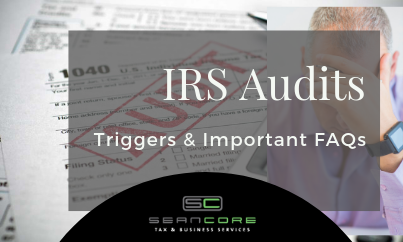Coronavirus has caused delays to tax return processing as well as payment processing
The Internal Revenue Service has delayed processing payments and paper returns due to the COVID-19 lockdown that shuttered America. People who sent tax payments to the IRS using paper checks are most affected and it will take some time for the IRS to catch up.
Do not send another paper check if your original paper check still hasn’t cleared the IRS account. It is part of the backlog of tax returns and other unsorted, unopened IRS business mail.
The IRS should not penalize a taxpayer if the IRS, itself, is late opening the mail. If a tax return or check is postmarked by the due date, they will consider it an on-time payment and there will be no fines or fees.
See also
IRS flexibility during the pandemic
Normally the IRS charges a $25 NSF penalty for bounced checks under $1,250. This year, in response to overwhelming financial hardship and delays at the IRS, it is waiving fees for dishonored checks received between March 1 and July 15.

Update from Sean Core CPA regarding Tax News and Impact from the Coronavirus (COVID-19) April 2020
If a taxpayer missed a filing deadline despite their best efforts, the IRS promises to be flexible and may even offer penalty relief. It has been suggested to write “COVID-19” on the return with a note describing why the payment is late.
The IRS extended the filing deadline to July 15 and allowed an extension to October 15. The IRS also extended the contribution date to an individual retirement account (IRA), health savings account (HSA), Archer medical savings account (Archer MSA), and Coverdell education savings account (Coverdell ESA) to July 15. This gives greater flexibility for taxpayers to claim prior-year contributions, depending on their individual situations.
2020 has been an unusual tax year resulting in unusual delays, but also unusual penalty forgiveness. To avoid unnecessary penalties, document your mailing dates and detail your circumstances on your returns and correspondence–especially if it’s a few days behind.
IRS Audits are not fun! How does the IRS decide who to audit, and who not to? The IRS is increasing automated ways to trigger audit suggestions. Discover here the 4 triggers and FAQ about IRS audits to pay attention to in 2019
You may feel triumph or relief when you send in your taxes. However, make sure to file your work papers and documentation with care. Not only will you want to be able to refer to them next year, there is always the possibility of an IRS audit.
Less than 1% of tax payers gets audits, however we do receive new clients every year because of this painful problem.Here are several things to know about IRS audits.
How the IRS decides which tax returns to
audit
The IRS checks all tax returns against other data it receives. For example, if you are employed, your employer files a W2 with the IRS. If you have interest or dividend income, your financial institution will file a 1099 with the IRS. If you neglect to include the information from these forms in your tax return, the IRS will notice and will probably contact you.
The
IRS also runs automatic statistical checks to look for outliers. If what you
claim looks very different from what others in similar situations claim, then
your tax return is more likely to be pulled out and reviewed. Even this does
not mean that you will definitely be audited. The IRS employee may look through
your return, compare it to other information, and decide everything is fine.
However, if the rest of the tax return is not satisfactory, then you’re more
likely to receive an audit.
Sometimes your tax return is not the main target in an audit. If you do business with another person, and that person is being audited, your taxes may be checked as well in order to make sure everything is in order.
“Do You Know the Safe Harbor Conditions of the IRC Section 199A Deduction? If not, you can know about it only by clicking on the following image.”
Flags for IRS audits
Here are situations that make your tax return more likely to receive an audit:
• Earning a lot of money. The greater your income is, the greater is the probability that you will receive an audit.
• Filing a Schedule C. A Schedule C means that you’re self-employed. If you show losses from year to year, the IRS may want to know if you are pretending that a hobby is really a business.
• Not reporting all taxable income. Remember the IRS gets all those W2s and 1099s and several other pieces of information as well.
• Not reporting all foreign bank accounts. Because of pressure that the United States has put on other countries, there’s a good chance that your foreign bank is also communicating with the IRS.
How the IRS will contact you
The IRS has a policy of contacting US taxpayers by mail, at least for starting an audit So, if you receive a phone call pretending to be from the IRS, this is almost always a scam. Do not fall for it; it could cost you seriously. Of course, after you have a genuine relationship with someone working at the IRS, they may arrange to call you.
Audits
themselves can be conducted entirely by mail, in which the auditor may pose
certain questions, for example about deductions or expenses, for which you
supply answers your answers by mail along with copies of documentation. You may
also experience an in-person audit. These audits may either be “office
audits” (at an IRS office) or “field audits” (such as your home,
your business, or somewhere else).
The IRS tries to conduct audits within
three years
The IRS keeps tax returns for six years. You may be audited on any of those years, so you should retain your documents and tax returns for at least six years. If your more recent taxes are intertwined with earlier years – for example, when you bought or sold stocks – you will want to keep those years and the supporting documents for the earlier years as well.
However,
the IRS usually tries to audit taxes within three years of their being filed,
so the probability of being audited on earlier years is very low.
The IRS is seriously understaffed
The Trump administration has not been replacing staff when they leave the IRS, and that means that this part of the government has experienced a reduction in personnel of about 25 percent. That translates into fewer audits being conducted.
Although this may be good for each individual taxpayer and business, the under-staffing at the IRS is not good for the revenue supplying the government. Fewer workers at the IRS means that fewer cheaters are being caught, and that means that less money is flowing in.
Even if you do get audited, you may not
have to pay more
If you have followed the tax code and can document your decisions, you may not have to pay more after being audited. Unfortunately for auditees, most taxpayers have to pay extra more after they are audited – as well as penalties and fees.
Being
audited is something few people anticipate with pleasure. If you follow the
rules, the likelihood of your being audited is very low. If you keep your files
and documents in order, being audited should be only a minor inconvenience.
If you are looking for a CPA with experience, and are located, or have property in the Phoenix area, we are accepting a few new clients. Please contact us by phone at 480-626-5043 or visit our Chandler office to set up an appointment to meet with one of our accountants!




